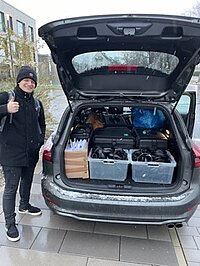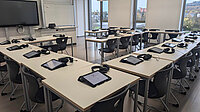Lasting learning in physics by constructive retrieval
When students learn about, for example, Newton’s laws in the context of linear motion in mechanics, they should understand the learning content so that they can apply their knowledge. Furthermore, the students should be able to retrieve this knowledge from memory weeks later when the topic of circular motion builds on it. However, students often forget the learning content when it is needed. Hence, understanding and consolidating learned content is important for student development. Our research project focuses on these two key instructional goals contributing to lasting learning in physics education: (1) understanding and (2) knowledge consolidation. One way to particularly support understanding (1) is to encourage generative learning activities such as (principle-based) self-explanations. By self-explaining, students connect example cases to underlying principles (e.g., Newton’s laws). Such linking of examples to principles leads to an elaborated knowledge structure about the learning content, especially when self-explanations are of high quality. One way to particularly support knowledge consolidation (2) is to provide learning tasks with the “desirable difficulty” that students must retrieve—instead of looking up—previously learned content (i.e., retrieval practice). Retrieval practice is most effective when the retrieval is effortful and successful.
In most previous research, generative learning activities and retrieval practice have been studied separately or they have been compared with respect to their effectiveness. Few studies have analyzed their combination, which is also known as “constructive retrieval”. In this project, our team of researchers from psychology and physics education from the Universities of Freiburg and Giessen cooperatively investigate whether constructive retrieval can fulfill the two instructional goals of lasting learning in physics education, that is, understanding and knowledge consolidation. In three experimental field studies, 11th-grade students work within a tablet-based learning environment about mechanics (Newton’s laws 1 and 2) as part of their regular physics instruction. We assess whether constructive retrieval is particularly appropriate to foster the attainment of lasting learning (i.e., understanding and knowledge consolidation; Experiment 1). Furthermore, we analyze whether providing metacognitive knowledge by “informed training” (i.e., providing information about the utility of the learning activities) boosts the effects of constructive retrieval (Experiment 2). Finally, we test whether more complex generative learning activities reduce constructive-retrieval effects (Experiment 3). Overall, we expect that constructive retrieval, when implemented with a not-too-complex generative learning activity and when combined with informed training, leads to effective lasting learning in physics. In the future, this method may serve as a model for structuring complex learning in other topics in the classroom.
Keywords: retrieval practice; generative learning; constructive retrieval; physics learning; lasting learning outcomes
Click here to see our team.
2025
Keller, S. D., Markwalder, U., Endres, T., & Praetorius, A.-K. (2025). Die Unterstützung des Konsolidierens – Eine zentrale, aber vernachlässigte Dimension von Unterrichtsqualität [Supporting consolidation is a central but neglected dimension of teaching quality]. Unterrichtswissenschaft, 53, 153–177. https://doi.org/10.1007/s42010-025-00229-5 (open access)
Obergassel, N., Renkl, A., Endres, T., Nückles, M., Carpenter, S. K., & Roelle, J. (2025). Combining generative tasks and retrieval tasks. Journal of Educational Psychology. Advance online publication. https://dx.doi.org/10.1037/edu0000949 (open access)
von Aufschnaiter, C. v., Endres, T., & Petermann, V. (2025). Entwurf eines Interessenmodells für die Naturwissenschaften [Design of a model of interest for the natural sciences]. In O. Krey, S. Bernholt, D. Laumann, & T. Rabe (Eds.), Interesse revisited (pp. 223–254). Springer. https://doi.org/10.1007/978-3-658-48542-9_5
von Aufschnaiter, C. v., Vorholzer, A., Eitel, A., Endres, T., Lieck, D. S. N., Wahby, N., & Renkl, A. (2025). Weil die Bewegungskraft ja da hin zeigt – Wie die Darstellung von Pfeilen in der Mechanik irritieren und helfen kann [Because the force points that way – How the illustration of arrows in mechanics can confuse and support]. MNU Journal, 3, 243–250. https://doi.org/10.17605/OSF.IO/9BDNS
2024
Endres, T., & Eitel, A. (2024). Motivation brought to the test: Successful retrieval practice is modulated by mastery goal orientation and external rewards. Applied Cognitive Psychology, 38(1), 4160. https://doi.org/10.1002/acp.4160 (open access)
Endres, T., Carpenter, S., & Renkl, A. (2024). Constructive retrieval: Benefits for learning, motivation, and metacognitive monitoring. Learning and Instruction, 94, 101974. https://doi.org/10.1016/j.learninstruc.2024.101974 (open access)
Grund, A., Fries, S., Nückles, M., Renkl, A., & Roelle, J. (2024). When is learning “effortful”? Scrutinizing the concept of mental effort in cognitively-oriented research from a motivational perspective. Educational Psychology Review, 36, Article 11. https://doi.org/10.1007/s10648-024-09852-7 (open access)
2023
Endres, T., Kubik, V., Koslowski, K., Hahne, F., & Renkl, A. (2023). Immediate benefits of retrieval tasks: On the role of self-regulated relearning, metacognition, and motivation. Zeitschrift für Entwicklungspsychologie und Pädagogische Psychologie [German Journal of Developmental and Educational Psychology], 55(2–3), 49–66. https://doi.org/10.1026/0049-8637/a000280 (open access)
Roelle, J., Endres, T., Abel, R., Obergassel, N., Nückles, M., & Renkl, A. (2023). Happy together? On the relationship between research on retrieval practice and generative learning using the case of follow-up learning tasks. Educational Psychology Review, 35, Article 102. https://doi.org/10.1007/s10648-023-09810-9 (open access)
2022
Richter, T., Berger, R., Ebersbach, M., Eitel, A., Endres, T., Borromeo Ferri, R., Hänze, M., Lachner, A., Leutner, D., Lipowsky, F., Nemeth, L., Renkl, A., Roelle, J., Rummer R., Scheiter, K., Schweppe, J., von Aufschnaiter, C., & Vorholzer, A. (2022). How to promote lasting learning in schools: Theoretical approaches and an agenda for research. Zeitschrift für Entwicklungspsychologie und Pädagogische Psychologie [German Journal of Developmental Psychology and Educational Psychology], 54(4), 135–141. https://doi.org/10.1026/0049-8637/a000258 (open access)
Roelle, J., Endres, T., & Renkl, A. (2022). Wie können Abrufübungen (nicht) für das Lernen in Schule und Hochschule relevant gemacht werden? Einleitung zur Thematik des Thementeils [How can retrieval practice (not) be made relevant for learning in school and higher education? Introduction]. Unterrichtswissenschaft, 50, 1–15. https://doi.org/10.1007/s42010-021-00139-2
Roelle, J., Schweppe, J., Endres, T., Lachner, A., von Aufschnaiter, C., Renkl, A., Eitel. A., Leutner D., Rummer, R., Scheiter, K., & Vorholzer, A., (2022) Combining retrieval practice and generative learning in educational contexts: Promises and challenges. Zeitschrift für Entwicklungspsychologie und Pädagogische Psychologie [German Journal of Developmental and Educational Psychology], 54(4), 142–150. https://doi.org/10.1026/0049-8637/a000261 (open access)
Here are a few impressions from our recent data collection for the Lasting Learning in Physics by Constructive Retrieval research project. We are excited to collaborate with some amazing schools and teachers to be able to do research within a real classroom setting and to gain many valuable insights from these collaborations. This marks the second of three data collections for this longitudinal study, and the third study conducted as part of our research project.
Go to main page




